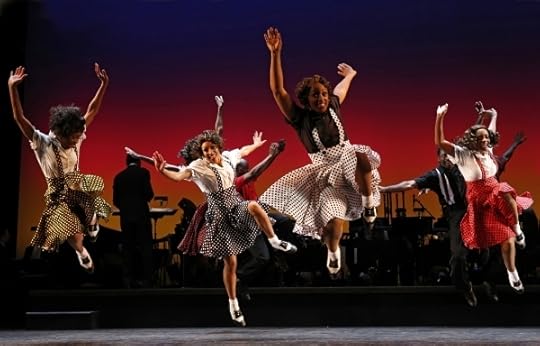Terry Teachout's Blog, page 73
June 30, 2013
TT: Almanac
George Orwell, Nineteen Eighty-Four
June 27, 2013
TT: A case of critical malpractice
* * *
 If you've ever wondered how much damage a drama critic can do, consider the case of N.C. Hunter. In the Fifties he was one of England's best-known playwrights, the author of school-of-Chekhov domestic dramas of middle-class loss and uncertainty that embodied the nagging anxieties of postwar audiences. Then Kenneth Tynan went to work on him with a rubber hose, sneering at "the vacuity of [his] attitude towards life" and dismissively comparing him to the angry-young-man playwrights like John Osborne whom Tynan saw as the salvation of British theater. Result: Hunter's plays slipped from sight. The Mint Theater Company's Off-Broadway revival of "A Picture of Autumn" is one of a bare handful of Hunter productions to be presented in this country since "A Day by the Sea" was seen on Broadway in 1955.
If you've ever wondered how much damage a drama critic can do, consider the case of N.C. Hunter. In the Fifties he was one of England's best-known playwrights, the author of school-of-Chekhov domestic dramas of middle-class loss and uncertainty that embodied the nagging anxieties of postwar audiences. Then Kenneth Tynan went to work on him with a rubber hose, sneering at "the vacuity of [his] attitude towards life" and dismissively comparing him to the angry-young-man playwrights like John Osborne whom Tynan saw as the salvation of British theater. Result: Hunter's plays slipped from sight. The Mint Theater Company's Off-Broadway revival of "A Picture of Autumn" is one of a bare handful of Hunter productions to be presented in this country since "A Day by the Sea" was seen on Broadway in 1955.Never having seen or read a Hunter play, I was curious to find out whether he deserved Tynan's abuse. Not a bit of it: "A Picture of Autumn" is impressive in every way, and the Mint's staging, directed with quiet intelligence by Gus Kaikkonen and acted by a top-drawer ensemble cast, is so strong that in a perfect world it would trigger a general revival of interest in Hunter's work.
Written and set in 1951, "A Picture of Autumn" is a group portrait of the Denhams, a trio of cash-strapped aristocrats (Jonathan Hogan, George Morfogen and Jill Tanner) who live in a moldering country house that they can no longer afford to keep up. All of them are growing frail and one is on the brink of senility. The oldest son (Paul Niebanck), a civil servant who has put his upper-class ways behind him, longs to move them into a modern flat, but the family's memories of "the old days, when we had cooks and things" remain so vivid that they can't imagine leaving.
In 1951 "A Picture of Autumn" was received by British playgoers as a study of a once-privileged class in decline. Six decades later, Americans who are trying to figure out how best to care for their own parents are more likely to give it an up-to-date spin. Either way, the Denhams' plight is stingingly bittersweet...
 "On the Town" made stars out of Leonard Bernstein, Betty Comden, Adolph Green and Jerome Robbins when it opened on Broadway in 1944, running for 462 performances. They stayed famous--but the show didn't. It's never been successfully revived in New York, nor does it get done regionally save on rare occasions. So I'm thrilled to report that Barrington Stage is putting on a production directed by John Rando ("All in the Timing") that is more than exciting enough to make you scratch your head in puzzlement. How could so exhilarating a musical have slipped through the cracks?...
"On the Town" made stars out of Leonard Bernstein, Betty Comden, Adolph Green and Jerome Robbins when it opened on Broadway in 1944, running for 462 performances. They stayed famous--but the show didn't. It's never been successfully revived in New York, nor does it get done regionally save on rare occasions. So I'm thrilled to report that Barrington Stage is putting on a production directed by John Rando ("All in the Timing") that is more than exciting enough to make you scratch your head in puzzlement. How could so exhilarating a musical have slipped through the cracks?..."On the Town" doesn't work without very well-made choreography, and Joshua Bergasse, who staged the dances for "Smash," delivers the goods in abundance. Though some of his moves are explicitly Robbinsesque, the comic numbers are fresh enough to make you wonder why his work has yet to be seen on Broadway. Mr. Rando is, of course, universally and deservedly admired--he directed the brilliant "Guys and Dolls" that Barrington Stage mounted two years ago--and the members of his youthful cast, especially Deanna Doyle, Alysha Umphress and Tony Yazbeck, collectively slam it out of the park....
* * *
Read the whole thing here .
Highlights from Barrington Stage's On the Town:
TT: Almanac
George Orwell, Nineteen Eighty-Four
June 26, 2013
TT: Pulling the plug
 Just the other day Kathy sent me a link to an online album of some three hundred-odd snapshots showing David hard at work on 713 Hickory Drive. I haven't been back to Smalltown since my mother's funeral, and I was thrilled to see the step-by-step transformation of the house into an up-to-date residence more perfectly suited to the needs of its happy new occupants. While I felt an occasional pang of sentiment as I looked at the pictures--after all, I grew up there--it's far more important to me to know that David and Kathy want not merely to keep the house in the family but to bring it back it to life.
Just the other day Kathy sent me a link to an online album of some three hundred-odd snapshots showing David hard at work on 713 Hickory Drive. I haven't been back to Smalltown since my mother's funeral, and I was thrilled to see the step-by-step transformation of the house into an up-to-date residence more perfectly suited to the needs of its happy new occupants. While I felt an occasional pang of sentiment as I looked at the pictures--after all, I grew up there--it's far more important to me to know that David and Kathy want not merely to keep the house in the family but to bring it back it to life.Strange as it may sound, it hit me harder when I dialed my mother's old phone number the other day and found that it had finally been disconnected. I've dialed that number thousands of times. It was in service for longer than I've been alive. It was on the phone that I last heard my mother's voice, and I'm still getting used to the knowledge that I'll never hear it again.
I wonder how long I'll remember her number. Probably for the rest of my own life, since I have an unusually retentive memory. It's amazing--and dismaying--how much useless information is firmly crammed into my well-stuffed head. Sometimes a good memory is a blessing, sometimes a curse, but most of the time it's just there, taking up space. Why on earth should I know who Richard Dimbleby or Amy Denovo or Henry Vars were? Yet I do, together with countless other dusty fragments of fact that I'm a able to retrieve far more readily than, say, the phone numbers of any of my present-day friends.
 At any rate, I expect I'll go to my grave knowing that the Teachout family's phone number was 471-3319 (formerly GR1-3319). No doubt I'd do better to know any number of more useful things, but usefulness, like goodness, has nothing to do with it. In the words of the contestants in The 25th Annual Putnam County Spelling Bee, Life is random and unfair/That's the reason we despair/Life is pandemonium. All that's certain--at least in my case--is that I will always be able to go back to the house where I grew up and be greeted with open arms, even if I can't find my way around the kitchen anymore.
At any rate, I expect I'll go to my grave knowing that the Teachout family's phone number was 471-3319 (formerly GR1-3319). No doubt I'd do better to know any number of more useful things, but usefulness, like goodness, has nothing to do with it. In the words of the contestants in The 25th Annual Putnam County Spelling Bee, Life is random and unfair/That's the reason we despair/Life is pandemonium. All that's certain--at least in my case--is that I will always be able to go back to the house where I grew up and be greeted with open arms, even if I can't find my way around the kitchen anymore.* * *
"Pandemonium," as performed by the original cast of The 25th Annual Putnam County Spelling Bee:
TT: So you want to see a show?
Here's my list of recommended Broadway, off-Broadway, and out-of-town shows, updated weekly. In all cases, I gave these shows favorable reviews (if sometimes qualifiedly so) in The Wall Street Journal when they opened. For more information, click on the title.
BROADWAY:
• Annie (musical, G, some performances sold out last week, reviewed here)
• Matilda (musical, G, all performances sold out last week, reviewed here)
• The Nance (play with music, PG-13, closes Aug. 11, some performances sold out last week, reviewed here)
• Once (musical, G/PG-13, most performances sold out last week, reviewed here)
• The Trip to Bountiful (drama, G, closes Sept. 1, reviewed here)
• Vanya and Sonia and Masha and Spike (comedy, PG-13, remounting of off-Broadway production, closes Aug. 25, most performances sold out last week, original production reviewed here)
OFF BROADWAY:
• Avenue Q (musical, R, adult subject matter and one show-stopping scene of puppet-on-puppet sex, reviewed here)
• The Fantasticks (musical, G, suitable for children capable of enjoying a love story, reviewed here)
• The Weir (drama, PG-13, closes Aug. 4, reviewed here)
CLOSING NEXT WEEK IN WASHINGTON, D.C:
• The Real THing (drama, PG-13, adult subject matter, closes July 7, reviewed here)
CLOSING NEXT WEEK OFF BROADWAY:
• Far From Heaven (musical, PG-13, adult subject matter, closes July 7, reviewed here)
CLOSING SATURDAY IN WESTPORT, CONN.:
• The Show-Off (drama, G/PG-13, reviewed here)
CLOSING SUNDAY IN ARLINGTON, VA.:
• Company (musical, PG-13, adult subject matter, reviewed here)
CLOSING SUNDAY IN RED BANK, N.J.:
• Present Laughter (comedy, PG-13, adult subject matter, reviewed here)
TT: Almanac
George Orwell, "Politics and the English Language"
TT: Stopping the clock
 Of making books there is no end, saith the preacher, and much study is a weariness of the flesh. The latter is true, the former less so. I sent in my final corrections to the text of
Duke: A Life of Duke Ellington
yesterday afternoon. At long last I'm done, and glad to be. For me, all that remains is to help sell the damn thing, and that formidable task doesn't start until October. I can put Duke out of my mind.
Of making books there is no end, saith the preacher, and much study is a weariness of the flesh. The latter is true, the former less so. I sent in my final corrections to the text of
Duke: A Life of Duke Ellington
yesterday afternoon. At long last I'm done, and glad to be. For me, all that remains is to help sell the damn thing, and that formidable task doesn't start until October. I can put Duke out of my mind.And will I? Probably not. After all, I've been thinking about Duke for the past four years, ever since I first got the idea to follow up Pops: A Life of Louis Armstrong with a biography of Ellington. It isn't easy to put so protracted and demanding a task behind you. In my experience, the only thing that works at all well is to replace it with a new, equally demanding task.
Fortunately, I have two on my plate. The first one you know about: The King's Man , my third operatic collaboration with Paul Moravec, opens in Louisville on October 11, six days before Duke is published, and we're still hard at work on it. The second one will be news to you: I've written a play about a small-town lynching called Breaking and Entering. Shakespeare & Company of Lenox, Massachusetts, where Satchmo at the Waldorf was produced last August, will give it a staged reading in August. Factor in the routine demands of my day job at The Wall Street Journal, and it seems a fairly safe bet that I won't have time to do much thinking about Duke Ellington between now and mid-October.
That, at any rate, is the way it's supposed to be. But the great engine of publicity (if I may lift a line from Duke) has already started to rumble, hiss, and spew out copy, and I expect I'll be reminded at regular intervals throughout the summer that I've got a book coming out in the fall. Two days ago, for example, Publishers Weekly printed a top-ten list of fall music books, and Duke was one of them. I'm in good company, for the PW list also includes new biographies of Bach, Beethoven, and Johnny Cash, plus memoirs by Donald Fagen, Graham Nash, and Linda Ronstadt. Duke is the only book about jazz that made the list.
 There will, of course, be bad news--there always is--but I'm hopeful that Duke will be received with at least some of the same enthusiasm that greeted Pops in 2009. I doubt it'll hurt that After Midnight, an all-Ellington revue, will be opening on Broadway two weeks after Duke hits the book stores, an exceedingly fortuitous piece of timing.
There will, of course, be bad news--there always is--but I'm hopeful that Duke will be received with at least some of the same enthusiasm that greeted Pops in 2009. I doubt it'll hurt that After Midnight, an all-Ellington revue, will be opening on Broadway two weeks after Duke hits the book stores, an exceedingly fortuitous piece of timing.In the meantime, I'm putting my feet up and doing my best to unwind. Breaking and Entering and The King's Man will be back on my mind tomorrow, with Duke lurking stealthily in the background. Today, though, I plan to rest. I've earned it.
While I take it easy, you might be amused to read the dust-jacket copy for Duke, on which I signed off two days ago. It'll give you a taste of things to come:
Edward Kennedy "Duke" Ellington was the greatest jazz composer of the twentieth century--and an impenetrably enigmatic personality whom no one, not even his closest friends, claimed to understand. The grandson of a slave, he dropped out of high school to become one of the world's most famous musicians, a showman of incomparable suavity who was as comfortable in Carnegie Hall as in the nightclubs where he honed his style. He wrote some seventeen hundred compositions, many of which, like "Mood Indigo" and "Sophisticated Lady," remain beloved standards, and sought inspiration in an endless string of transient lovers, always hiding his inner self behind a smiling mask of flowery language and ironic charm.
Wall Street Journal critic Terry Teachout, who played jazz bass professionally before becoming a full-time writer, has drawn on unpublished private papers, musical manuscripts, scrapbooks, and transcripts of breathtakingly frank interviews to uncover the facts about the public and private lives of Duke Ellington, placing him in the context of the Harlem Renaissance and examining his influence on 20th-century art and culture. The first full-length Ellington biography in nearly two decades, Duke peels away countless layers of evasion and deception to tell the unvarnished truth about the creative genius who inspired Miles Davis to say, "All the musicians should get together one certain day and get down on their knees and thank Duke."
And there you have it...for now.
June 25, 2013
TT: Snapshot
(This is the latest in a series of arts-related videos that appear in this space each Monday and Wednesday.)
TT: Almanac
George Orwell, "The Limit to Pessimism"
June 24, 2013
TT: Lookback
When I wrote about the Library of America's superlative two-volume set devoted to journalism in World War II, I was struck by how many of the least dated pieces had originally appeared in The New Yorker--one doesn't usually think of The New Yorker as a source of first-rate war coverage--and by how many of the best of those pieces had been written by A.J. Liebling. He originally made his name writing about peculiar New Yorkers, and nobody except Ross expected that so utterly urban a character would have the slightest notion of what to do in a war zone. But time and again, Liebling buried the puck in the net...
Read the whole thing here .
Terry Teachout's Blog
- Terry Teachout's profile
- 45 followers



